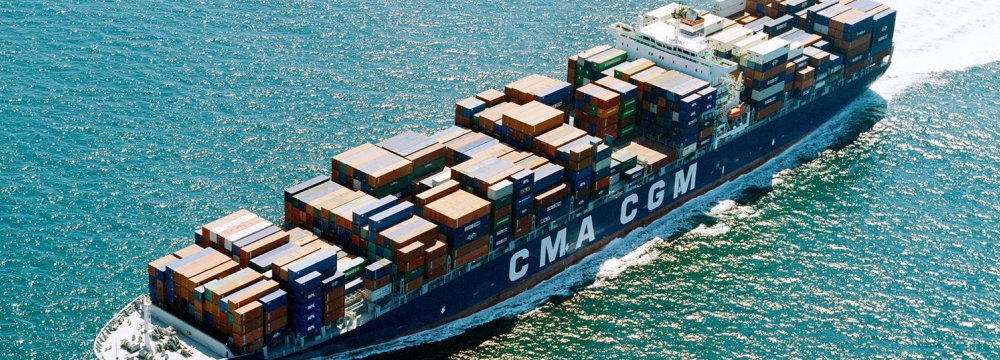
CMA CGM Says It Has Sufficient Security to Operate in Persian Gulf

The Persian Gulf is a key route for oil tankers, while container shipping companies often use the Suez Canal route, Reuters reported.
CMA CGM stopped services in Iran last year in light of US sanctions, but company chairman and CEO Rodolphe Saade said CMA CGM was still sailing through the Persian Gulf.
“We are continuing to go there,” Saade told reporters at a business conference in Aix-en-Provence.
“Due to the Trump administration, we have decided to end our service for Iran,” Saade said last year, adding that that his company’s cooperation agreement with local Iranian partner Islamic Republic of Iran Shipping Lines had been suspended and that the company did not want to fall foul of the rules, given their large presence in the United States.
CMA CGM, according to the United Nations, accounts for more than 11% of global capacity.
The shipping company called at Shahid Rajaee, Iran’s biggest container port at the mouth of Strait of Hormuz in August 2016 after years of economic sanctions against the Islamic Republic.
The company teamed up with IRISL to share vessel capacity and jointly operate routes and marine container terminals. Later, it launched a Tehran office, appointing CMA CGM Pars as its new agency in Iran as of May 1, 2017.
Asked if CMA CGM had stepped up security on vessels going through the Persian Gulf, Saade replied: “No, because the measures we have in place are already sufficiently elevated.”
Saade added on Sunday that CMA CGM’s overall volumes of business were good, despite the impact of tensions in the Middle East and a trade dispute between the United States and China.
In May, CMA CGM reported a first-quarter net loss of $43 million, although group sales surged 36.9% to $7.41 billion, as earnings were impacted by slowing China-US trade and higher lease costs.
“No foreign maritime company has announced a change in its port call programs after a US spy drone was shot down by Iranian air defense units last month,” the head of Iran's Ports and Maritime Organization, Mohammad Rastad, said, reassuring that tensions between Tehran and Washington cannot affect international activities on seas.
The June 20 incident of an American spy drone being shot down by Iranian air defense units in the territorial waters of the country has not had an adverse effect on international ships entering Iranian waters, he added, on the sidelines of the ceremony to mark the International Day of Hydrography in Tehran on June 25.
Rastad said all major international shipping companies are maintaining port calls to Iran, despite unilateral US sanctions.
“Sanctions cannot deprive Iran of maritime trade,” he said, explaining that Iran’s maritime capacities trump the sanctions.
Rastad also brushed off possible fallout from recent suspicious attacks on oil tankers in the Persian Gulf and the Sea of Oman, adding that Iran would sue the United States at the International Maritime Organization for sanctioning its maritime transport services, Fars News Agency reported.



Trump weighs using $2 billion in CHIPS Act funding for critical minerals

Codelco cuts 2025 copper forecast after El Teniente mine collapse

Electra converts debt, launches $30M raise to jumpstart stalled cobalt refinery

Barrick’s Reko Diq in line for $410M ADB backing

Abcourt readies Sleeping Giant mill to pour first gold since 2014

Nevada army depot to serve as base for first US strategic minerals stockpile

SQM boosts lithium supply plans as prices flick higher

Viridis unveils 200Mt initial reserve for Brazil rare earth project

Tailings could meet much of US critical mineral demand – study

Kyrgyzstan kicks off underground gold mining at Kumtor

Kyrgyzstan kicks off underground gold mining at Kumtor

KoBold Metals granted lithium exploration rights in Congo

Freeport Indonesia to wrap up Gresik plant repairs by early September

Energy Fuels soars on Vulcan Elements partnership

Northern Dynasty sticks to proposal in battle to lift Pebble mine veto

Giustra-backed mining firm teams up with informal miners in Colombia

Critical Metals signs agreement to supply rare earth to US government-funded facility

China extends rare earth controls to imported material

Galan Lithium proceeds with $13M financing for Argentina project

Kyrgyzstan kicks off underground gold mining at Kumtor

Freeport Indonesia to wrap up Gresik plant repairs by early September

Energy Fuels soars on Vulcan Elements partnership

Northern Dynasty sticks to proposal in battle to lift Pebble mine veto

Giustra-backed mining firm teams up with informal miners in Colombia

Critical Metals signs agreement to supply rare earth to US government-funded facility

China extends rare earth controls to imported material

Galan Lithium proceeds with $13M financing for Argentina project

Silver price touches $39 as market weighs rate cut outlook

















